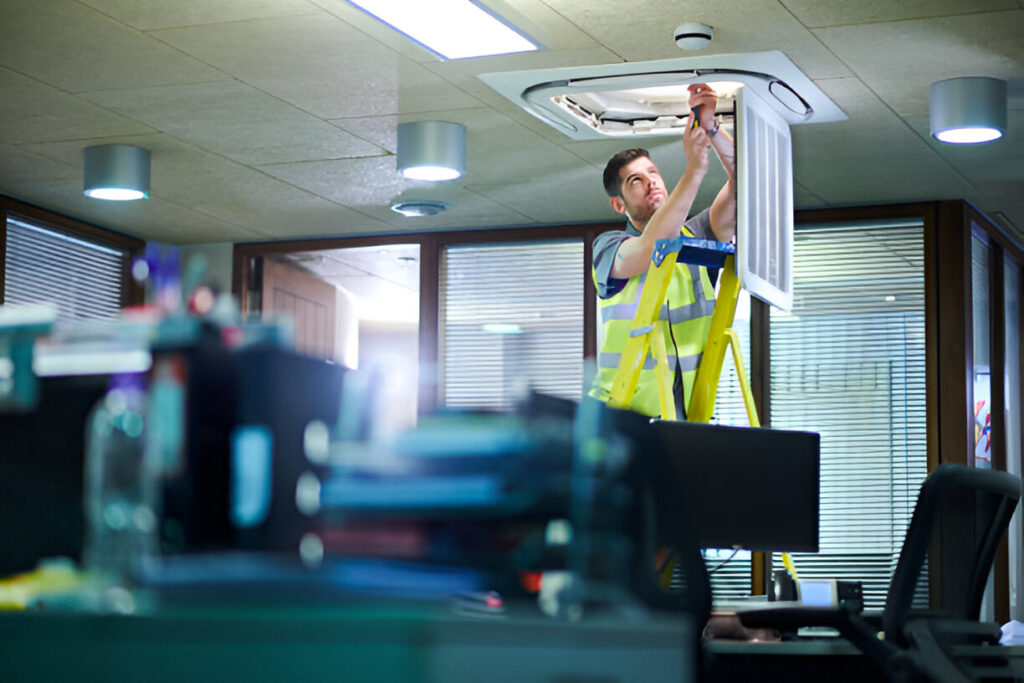A thriving business is built on many foundations—talented employees, effective leadership, innovative ideas, and strong client relationships. However, one vital element often overlooked is the physical space where work happens: the office building itself. Regular office maintenance might not make headlines, but its role in safeguarding a company’s long-term success is significant. From enhancing productivity to ensuring safety and preserving assets, consistent building care is an investment that pays off in more ways than one.
First Impressions Matter
Your office building is often the first interaction clients, partners, and potential hires have with your company. A well-maintained facility communicates professionalism, attention to detail, and pride in your brand. Peeling paint, broken lighting, or malfunctioning elevators, on the other hand, can send the opposite message—suggesting neglect or disorganization.
Clean lobbies, functional restrooms, spotless windows, and tidy meeting rooms reflect a company’s standards. These visual cues help establish trust and confidence before a single conversation begins. Regular maintenance ensures that every corner of your office supports your company’s image and values.
Boosting Employee Productivity and Morale
A well-maintained workspace isn’t just about aesthetics; it directly impacts employee well-being. Leaky roofs, poor ventilation, flickering lights, or malfunctioning heating systems can quickly disrupt work and affect morale. Employees who feel their comfort and safety are valued are more likely to remain motivated and focused.
Regular maintenance ensures a pleasant environment with clean air, consistent temperature, and functional infrastructure. It reduces distractions and downtime while fostering a sense of pride in the workplace. When employees work in a clean, well-lit, and organized space, they’re more productive and engaged.
Preventing Costly Repairs
One of the most compelling reasons for routine office maintenance is cost savings. Like any structure, office buildings experience wear and tear. Ignoring small issues—like a minor plumbing leak or a cracked window—can lead to more extensive and expensive repairs down the road.
Preventive maintenance addresses problems before they escalate. Regular inspections of HVAC systems, plumbing, electrical wiring, roofing, and elevators can identify and fix issues early. This proactive approach helps avoid sudden breakdowns that can halt operations or result in emergency repair costs.
Ensuring Health and Safety Compliance
Keeping your office environment safe isn’t just best practice—it’s a legal obligation. Workplace health and safety laws require employers to maintain hazard-free conditions. Failing to properly maintain your building can result in serious workplace injuries, costly legal consequences, or failed safety inspections. In fact, Utah injury lawyers frequently handle cases where inadequate maintenance led to preventable accidents and employee harm.
Regular upkeep plays a vital role in avoiding these risks. It ensures that fire alarms are operational, emergency exits are unobstructed, and lighting is sufficient throughout the space. It also involves addressing potential health hazards like mold, pests, and poor air quality. A clean, well-maintained office not only protects your team’s health but also safeguards your company from liability and reputational damage.
Enhancing Sustainability and Energy Efficiency
An often overlooked benefit of regular maintenance is its role in improving energy efficiency. Buildings with well-maintained HVAC systems, insulated windows, and energy-efficient lighting consume less power and leave a smaller carbon footprint.
For example, clogged filters or outdated thermostats can force HVAC systems to work harder, increasing energy bills. Fixing such issues through routine checks can lead to substantial savings and help your company meet sustainability goals. Additionally, sustainable operations resonate with environmentally conscious customers and stakeholders.
Prolonging the Life of Your Assets
Your office building is a significant financial investment. Just like vehicles or equipment, it requires regular upkeep to extend its lifespan. Preventive maintenance preserves structural integrity, protects against environmental damage, and keeps your office functioning smoothly for years to come.
Well-maintained buildings also retain higher property value. If you lease your space or eventually plan to sell, a clean, functional, and updated property is more attractive to tenants and buyers. Regular maintenance ensures that you protect and even increase your investment over time.
A Strategic Business Priority
Ultimately, office maintenance should be seen not as an expense but as a strategic business decision. It supports everything from brand perception and employee retention to legal compliance and cost control. Prioritizing regular building upkeep demonstrates leadership foresight and a commitment to operational excellence.
To implement a successful maintenance strategy, consider working with professional facilities management teams, creating a detailed maintenance schedule, and encouraging staff to report issues promptly. Whether it’s daily janitorial work, monthly system checks, or annual building inspections, consistency is key.
In Conclusion
Office maintenance is about more than keeping a space clean—it’s about creating a foundation for business success. By investing in regular upkeep, companies can ensure smooth operations, protect their assets, and create a positive environment for everyone who walks through their doors. In a competitive business world, maintaining your office building isn’t just smart—it’s essential for long-term growth and sustainability.



